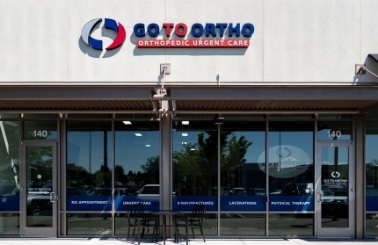
The workers’ compensation claim process can be complicated – even experienced HR managers and HR specialists have questions about the nuances of workers’ compensation law. The fact that workers’ compensation rules and regulations differ from state to state doesn’t make the process any easier. Go To Ortho sat down with top Oregon workers’ compensation lawyer Lauren Oda to get all our questions answered.
Lauren Oda joined Sather, Byerly & Holloway, LLP in 2011. She represents Oregon and Washington employers and insurers in workers’ compensation and related employment matters. Prior to her current position, Lauren practiced law in her hometown of Hillsboro, where she handled criminal and plaintiff personal injury matters.
Lauren studied abroad in Santiago, Chile, and is fluent in Spanish. She graduated from the Willamette University College of Law in 2010. She is a member of the Workers’ Compensation Section of the Oregon State Bar, Oregon Women Lawyers Society, Washington County Bar Association, Washington State Bar Association, Washington Self-Insurers Association, Oregon Workers’ Compensation Claims Association, and Risk and Insurance Management Society Oregon Chapter.
Q: What are the first steps an HR manager or specialist should take when a worker says he or she has been injured
A: Employers have 5 days from the date they receive notice of a claim or accident to notify their insurer. There are several pieces of information that must be included on the notice, and it is generally provided on Form 801 “Report of Job Injury or Illness.” Failure to notify the insurer timely may result in civil penalties.
Q: Now that marijuana is legal in Oregon, how does that influence drug testing after an injury at work?
A: It really hasn’t changed how employers test. If the employer’s policy is to drug test after any work injury, then they can continue to test. The same standard applies regarding the compensability of the work injury. The employer would have the burden of proving the drug use was the major contributing cause of the work injury to avoid compensability.
However, depending on the employer’s drug policy, a positive test for marijuana could result in termination of employment.
Q: What kind of injuries and illnesses are covered by workers’ compensation?
A: When we think of workers’ compensation injuries we often think of a traumatic injury due to a sudden accident at work, resulting in disability or death. Workers’ compensation covers more than just sudden accidents. An injury also can develop over time due to cumulative trauma, such as tendonitis or carpal tunnel syndrome. Additionally, workers’ compensation covers occupational diseases, which are medical conditions caused by work that develop over an indefinite period of time, such as occupational asthma or contact dermatitis.
Q: Does the injury have to happen at the workplace to be eligible for a workers’ compensation claim?
A: Not necessarily. A compensable injury is an injury arising out of and in the course of employment that results in disability or the need for medical treatment. This must be established by objective findings. There is a two-prong test:
- The time, place, and circumstances of the injury.
- Both prongs have to be satisfied for the injury to be compensable under workers’ compensation. Each case is decided based on the case-specific facts. Some examples of injuries that could be compensable are:
- If an employee is injured during a commute and the employer provided the vehicle in which the worker traveled to and from the workplace.
- If the employer directed an employee to perform a task (special errand) that took them off the worksite.
- If the employer exercises control over the parking lot (parking lot rule), it becomes part of the employment environment and injuries are compensable.
- When employees are traveling, they are considered to be continuously in the course and scope of employment continuously (generally even when the worker is injured during personal activities).
Traveling employees can be considered no longer “in the course and scope of employment” when there is a distinct departure or detour. For example, if they travel to Maryland for a work conference, and then take several days to visit family in the area before flying back home.
Q: Are there any kind of work injuries not covered by workers’ compensation?
A: From a medical standpoint, an injury that was not caused in material part by work activities, or an occupational disease not caused in major part by work activities. For example, if someone has had asthma all their life and they get asthma symptoms at work, that wouldn’t be considered an occupational disease because it wasn’t caused “in major part” by work activities. From a legal standpoint, there are several situations where an injury or disease would not be compensable. For example:
- Horseplay: an active participant or instigator of horseplay takes the worker outside the “course and scope of employment” even if the horseplay is happening at work. The exception to this is if the employer knew or should have known about the horseplay, and acquiesced to the behavior.
- Injuries sustained by an employee who initiated a physical or verbal altercation that invited a physical attack. That means you don’t have to throw the first punch – if you verbally initiated the attack, you’ve taken yourself out of the “course and scope of employment.”
- Intentional self-injury.
- Lunch break: an injury sustained during a lunch break is generally not compensable, but it’s decided on a case by case basis. Special factors must be evaluated, such as whether the worker was on a special errand, had a dual purpose or was socializing for the employer’s benefit.
- Recreational and social activities: if social or recreational activities were primarily done for personal pleasure, then they are typically not compensable. For example, a worker plays basketball with co-workers during an afternoon break using a basketball hoop in a courtyard maintained by the employer. The worker jumps up and taps the backboard after the game and injures his knee. The injury would be excluded.
- Drug and alcohol use: If an employer suspects or knows drugs or alcohol played a role in an employee’s injuries, the burden of proof is on the employer to prove that drugs or alcohol was a major cause of the injury. Additionally, the employer must not have permitted, encouraged or had knowledge of use.
Q: In Oregon, can HR managers and specialists recommend specific medical clinics to an injured worker?
A: No, they cannot.
An employer is not allowed to direct a worker’s medical care. However, as a service to employees, the employer could provide a list of occupational health providers in the area. The list would need to include more than one provider and could also include a disclaimer that the employer is not directing care but providing a list of local providers as a convenience to employees.
Do You Have Further Questions?
If you have any further questions about workers’ compensation law, contact Lauren Oda at loda@sbhlegal.com or 503-595-2139.Thank you, Lauren Oda, for your insight into the workers’ compensation process here in Oregon!
What Can Go To Ortho Do For You?
If you are an HR manager or specialist and would like to hear more about how Go To Ortho’s award-winning orthopedic surgeons can be a good option for your employees, contact Go To Ortho at info@gotoortho.com to learn more or request an in-person meeting.
If you are an injured worker, Go To Ortho is an urgent care clinic in Beaverton & Lake Oswego, where you can see an orthopedic specialist immediately, no appointment needed. We’re experienced at walking you through the workers’ compensation claim process. Contact us at 503.850.9950 for more information, or just stop by the clinic.
Contact us at 503.850.9950 for more information, or just stop by the clinic.



